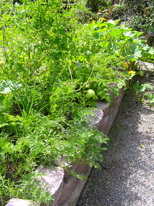 Raised bed with clean soil
Raised bed with clean soil In addition to having no idea how many heat units I might be able to expect or if it will rain in May, I have another major challenge in my gardening. My property is located within the plume of a copper smelter that operated on the Tacoma/Ruston waterfront for almost one hundred years. My soil is contaminated with arsenic and lead, so I had the ASARCO Clean-Up Team do soil sampling to get a data-based idea of what is happening in my gardens. We found some interesting results.
I have been removing topsoil to rid my garden of the toxins so my counts, while high, did not qualify for remediation. The researchers told me to continue to raise all food crops in raised beds and if digging dry native soil to wear a face mask.
So, what happens when soil is toxic? Does the arsenic or lead go away? No. My soil still tested high despite my efforts to dilute the toxin and get rid of toxic topsoil. I’ve been doing the same things that would be done in remediation, but my soil is still contaminated. By contrast, my imported soil is fine, and I have no trouble growing whatever I want in it. The problem is that importing clean topsoil is expensive, so I get only a couple loads every year.
One question I asked the researchers taking my soil samples was, “Can I make compost out of the weed clippings from contaminated soil?” The researchers took soil samples from where I had composted some weeds. The compost tests turned out to have the highest toxin rating of any spot on my property. Apparently, the weeds do pick up the toxins from the soil and concentrate them when made into compost.
I wonder how many years it will take for the weeds to pull all the toxins out of the soil. I’ve been gardening here for fourteen years and my soil is still too toxic to work without a facemask. Fourteen years is not long enough for common plants to pull the toxins out of the soil. Of course if the weeds stay in place they do no good at all. Perhaps mushrooms would pull the toxins out faster, but then, one must pick the mushrooms and dispose of them at a toxic waste facility. Plants that are particularly good at removing toxins would also have to be disposed of in a toxic waste facility if you can find one that takes organic matter. For now, I will continue to dispose of my toxic weeds in the wooded areas of my property where I don’t garden.
So, in my yard, material grown in-ground is spread under the trees, and I make a compost pile of organic matter that is grown in clean soil. Thus, when out working in the garden we sort weeds from raised beds into one garden cart while weeds and cuttings from another bed go into another cart. It is more trouble than it sounds.
My experience causes me to ask questions about our food supply and agri-business. I garden on less than an acre. I have been pulling toxins out of my soil for fourteen years, and it is still too toxic to produce edible crops. Now, multiply this problem by a thousand. What will happen with the thousand-acre farm that has been dumping glyphosate (Roundup) on the ground for forty years? The longer the toxins are dumped on the soil, the more concentrated they will become. Like my arsenic, glyphosate isn’t going away by itself, and food crops will pick it up. It is a problem because it causes birth defects and has been linked to autism. How on earth will those who follow our foolish agribiz-farmers ever clean up this mess? How will people eat when our whole Midwest is reduced to a few farms or growing in raised beds?
 RSS Feed
RSS Feed